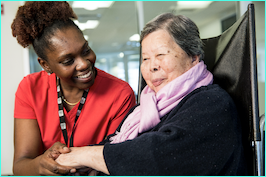Speak up!
If you've written a blog, wish to share a story, or have an idea that you believe would help those visiting the End With Care website, please send it along. If fitting, we'll add your voice to End With Care.
I've got an ideaAn Introduction to End-of-Life Doulas
Posted on March 5, 2019
 When you hear the word “doula,” you may think of a person who assists a woman during childbirth. But did you know that another type of doula exists to help those not at the beginning of their lives, but at the end? Here is everything you need to know about end-of-life doulas.
When you hear the word “doula,” you may think of a person who assists a woman during childbirth. But did you know that another type of doula exists to help those not at the beginning of their lives, but at the end? Here is everything you need to know about end-of-life doulas.
What is an End-of-Life Doula?
Also known as a death doula or death midwife, end-of-life doulas provide care and support to those transitioning through the dying process. For the dying patient, they may provide emotional, physical, and spiritual support and help address the patient’s wants and needs during the final days of life. They may also assist with logistical tasks, not limited to creating a death plan, planning a memorial service, and organizing a legacy project for future generations. An end-of-life doula may also offer support for family members during their loved one’s dying process and offer grief support afterwards.
While traditional doulas and midwives have been around for centuries, the rise of death doulas is a relatively new movement. As our culture begins to recognize the importance of speaking up about death and dying, end-of-life doulas have become more prevalent. Through the international “Death Positive” movement, there has been a call for death doulas to help dying individuals carry out their final days with openness and dignity.
What Isn't an End-of-Life Doula?
The role of the end-of-life doula does not replace other professionals such as hospice nurses or home health aides. Instead, the doulas work alongside these professionals, filling in any gaps in care that might exist. Although doulas might have medical training, it is not required, as it is a strictly non-clinical role. Rather than focusing on giving medical care, doulas provide emotional, informational and logistical support and comfort for the dying and their loved ones.
Becoming a Death Doula
End-of-life doula trainings are becoming more widely available throughout the US and internationally. There are a number of reasons for becoming a death doula, including a full-time or part-time career path. You may also choose to take an end-of-life doula training in order to be better prepared to guide friends and family when they face death. Death doulas will be able to volunteer in a hospice or hospital, serve in their community, or simply explore the issues of death and dying for their own personal growth. If you are interested in such a training, you may consult the International End of Life Doula Association for more information.


